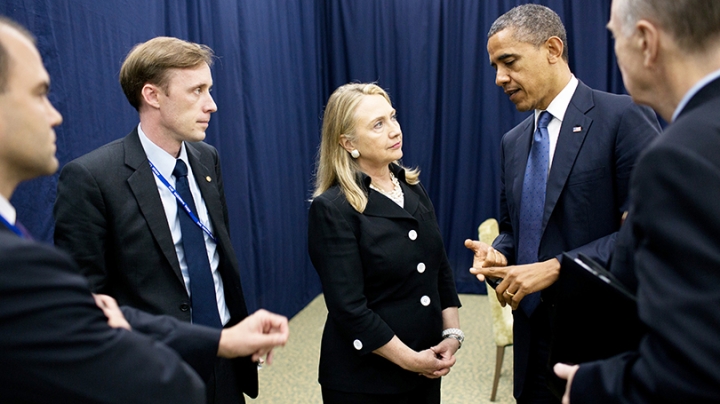Jake Sullivan, former U.S. State Department director of policy planning and top adviser in the Obama administration, will be teaching, meeting with students and faculty, and engaging with the Dartmouth community next year, first as a Montgomery fellow and then as a Dickey Center Magro Family Distinguished Visitor in International Affairs.
“Jake is an extraordinary talent. He is incredibly insightful, he has remarkable people skills—there is no pretense and I think that was a big part of his success,” says Daniel Benjamin, the Norman E. McCulloch Jr. Director of the John Sloan Dickey Center for International Understanding, who worked with Sullivan at the State Department. “He’s definitely one of the foreign policy stars of the period.”
When Benjamin went to work as coordinator for counterterrorism at the State Department in 2009, Sullivan was deputy chief of staff for Secretary of State Hillary Clinton. The two men served together throughout the Obama years as Sullivan went on to posts as national security adviser to Vice President Joe Biden and director of policy planning at the State Department. “And this was all by the time he was 34 years old,” Benjamin says.
Currently teaching at Yale, Sullivan, whose international policy analysis has appeared widely in publications including Foreign Policy, The New York Times, and The Washington Post, says he is looking forward to starting work at the College.
“I’m excited to come to Dartmouth because it offers not just an amazing faculty of scholars that I’ve read and respected over many years, and not just a diverse, dynamic student body that will one day help lead the world in confronting the great shared challenges of our time—it offers the merger of those two assets in a community committed to teaching and learning,” Sullivan says.
During the winter term, Sullivan will be in residence through the Kenneth and Harle Montgomery Endowment, established in 1977 to host distinguished guests on campus to enrich the intellectual life of the College. During his residency, Sullivan will teach a class in diplomacy through the government department, meet with students and faculty, and deliver a public lecture.
In the spring, Sullivan will continue his residency at the John Sloan Dickey Center for International Understanding through the Magro Family fellowship, established to support Dickey visitorships for “outstanding practitioners from various realms of international affairs.”
During the spring term he will teach “The Future of the International Order” in the government department, meet with the War and Peace Fellows and other student groups, and present the Magro Family lecture.
Sullivan says his classes will examine trends that are shaping geopolitics today, including changes in the distribution of power among states, the diffusion of power away from states to a variety of non-state actors, and the crisis of governance within states.
But Sullivan wants to move beyond a strictly academic analysis. “I am eager to help students understand that foreign policy decision-making is a deeply human exercise. It is imperfect people, with imperfect information, in an imperfect process, facing imperfect choices—so it’s no surprise that they produce imperfect results,” he says.
“And I want students and my colleagues to ask a hard question that we haven’t really faced squarely: What is American foreign policy for? Why do we do what we do in the world? A quarter century after the end of the Cold War, it’s high time we sharpened our answers to these questions.”
William Platt can be reached at william.c.platt@dartmouth.edu.


